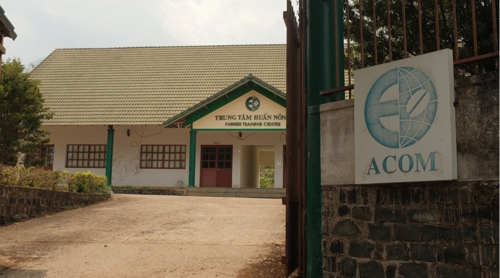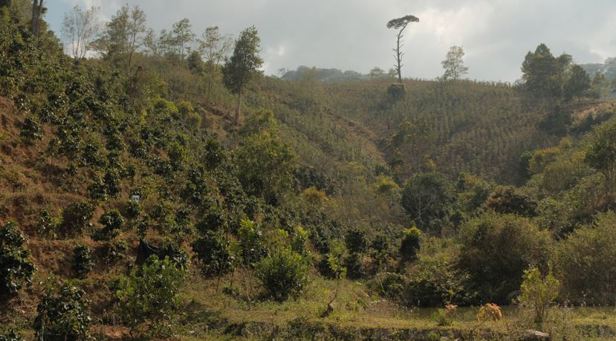05/04/24
Deep diving into traceability with the Vietnam SMS team
Article by: Michaela Tomchek
After Latin America Last year, she now headed to Vietnam where she travelled with the SMS operations. She will be narrating her trip and experiences through a mini-series which will be shared throughout the rest of the calendar year.
Rich with cultural history, political turmoil, and an extraordinary agricultural reform post-war – Vietnam is an interesting country amongst the coffee-producing regions. Not only that, but it is the second leading producer of the crop, primarily growing the lower quality species, Robusta.
The country was ruled by the French in the 1800s, who brought coffee to the lands via French missionary ships. The Central Highlands were selected as the pristine area to begin coffee cultivation, and it is still where much of the coffee in Vietnam grows today.
After the war that ravaged the country from 1955 to 1975, the Đổi Mới reform was enforced in 1986. This led to an intense reform amongst the agricultural lands, and caused an upsurge in agricultural production, one crop of which was coffee. The government allowed for private farms to be owned, and they heavily encouraged coffee production, even amongst smallholder lands. Quality was not a concern, so all coffee was purchased at a set price.
Today, 95% of production is Robusta and maintains the highest yields per hectare throughout the world. Smallholders are an important part of production, with 63% (665,000) families responsible for coffee. Funding and support from the government has been funnelled into researching new hybrids and to improve grafting methods. Thanks to this research, producers are able to access trees with more disease-tolerant qualities.
The Atlantic Commodities Vietnam Ltd., Co. (ACOM) began its operations 21 years ago and now operates in five provinces of Vietnam: Lam Dong, Dak Nong, Gia Lai, Dak Lak, Kon Tum and Son La. The Sustainable Management Services (SMS) team began its work to improve the sustainability of coffee production and communities in Vietnam in 2010. Today, there are 26 SMS staff working in Vietnam.

There are numerous innovative and forward-thinking research projects going on throughout Vietnam thanks to the work of SMS. These include two experimental farms, Pleiku and Bao Loc (4 hectares each) where different planting methods and fertiliser applications are trialled and tested. SMS are also involved with research projects including VSCOPE (on fertiliser uses, optimization of organic fertiliser and agroforestry), BOLERO (on rootstock for cocoa and coffee to face dryer conditions), insurance for farmers due to climate disasters, and the BROCAP (assessing the efficiency of insect traps to control the Coffee Berry Borer (CBB)). There is also a client carbon project, monitoring experimental plots to showcase better fertiliser uses and measure coffee on-farm carbon footprint. Not only that, but SMS are also working on nurseries to grow high quality seedlings of Arabica and Robusta to disperse to producers throughout the country. The nurseries are currently growing Mundo Maya, Centroamericano, Starmaya, and a local variety called THA1, according to Thuận Sarzynski, SMS Manager in Vietnam.
In addition to these various projects, the SMS team are working diligently to monitor and maintain traceability of the producers they work with. Currently, the team has collected information from 4,000 producers, with a goal to add 2,000 more by the end of the year. In all of Vietnam, ACOM sources coffee from over 10,000 producers, a monumental feat. The agronomists collect data to record the producer’s name and ID, farm ID, a consent form, area, yield, and GPS point with paper or smartphones. With this data, ACOM is able to trace each coffee back to a specific producer and farm. Each client throughout the world can then receive a report on where exactly their coffee comes from. And the producers’ needs are more easily met with regards to fertiliser demands or new seedling dispersal. All of these producers have certifications including 4C, RA, CP, and SMSV.
Another innovative project being run by ACOM is the Dung K’No village in the province of Lam Dong populated by the K’Ho ethnic group. The altitude here is over 1,800 metres above sea level, and the producers only grow Arabica. The project started back in 2018, and now works with 180 producers. Typically, farmers will grow Catimor or older varietals such as Typica and Bourbon. SMS are now visiting this site to teach producers how to grow more efficiently and improve the quality of the coffee. During the harvest, producers will collect their cherries and deliver them to the collection point in the village. The cherries are then transported to the Duc Trong Wet Mill to be processed separately utilising the Washed, Natural, and newer Anaerobic Natural processing methods.
Vietnam production is expansive. The ACOM team, along with SMS are working to not only improve agricultural practices amongst producers, but also teaching them about quality whilst seeking ways to expand specialty coffee in these regions and improving traceability. Truly forward-thinking and looking to increase the income of these many coffee-producing communities.

More news
Stories
Click to read this articleNurturing Soil Health in Vietnam
The SMS team in Vietnam have been working to soil erosion through structured trainings, refining their soil health and nutrition projects, and creating an impressive soil program catered to each individual farmer certified through their system.
Stories
Click to read this articleBetter Life Farming in Mexico
Since 2013, SMS implemented various actions to promote farm renovation, focusing on training and awareness among producers about the advantages of coffee plantation renewal.
Stories
Click to read this articlePublic welfare activities for students in Chinese coffee communities
In order to improve the vocational skills of disabled students and enable them to master a skill. On April 18, the SMS department of Pu'er Tianchen Coffee Co., Ltd., and delegates went to Pu'er Special Education School to carry out public welfare activities to build the capacity of coffee community students.
News
Click to read this articleStrengthening the knowledge of cacao producers in Peru
In an effort to promote sustainable improvement in cocoa production, ECOM Peru brought together 70 associated producers in an enriching field event on January 30 and 31 in the Huánuco region.
Stories
Click to read this articleClean Water Access for Smallholder Farmers in Uganda
In 2021 Kawacom initiated a three-year project in partnership with Taylors of Harrogate with a focus on water, sanitation, and hygiene aimed to support 13,500 farmers and their families in the coffee-growing communities around the Sipi region.
Stories
Click to read this articleA Transformative Project for Sustainable Farmers
In November 2023, our “Coffee, Cocoa and Climate Change '' project in collaboration with the German Agency for International Cooperation GIZ in Nicaragua was concluded. Read more about it here.
Stories
Click to read this articleGulfood Dubai 2024
It's a wrap! The ECOM Village reopened its doors at the Gulfood in Dubai from the 19th to 23rd February and for the first time as a cross commodity show! Read more about it here.
News
Click to read this articleNetZero e EISA anunciam parceria pioneira para construção de uma fábrica de biochar em Machado (MG)
NetZero, green tech francesa pioneira na valorização de resíduos agrícolas em biochar, e EISA café, Empresa Interagrícola S.A. do Grupo ECOM, anunciam a construção de uma fábrica de biochar em Machado (MG).
News
Click to read this articleNetZero and ECOM announce pioneering partnership for large-scale biochar deployment in coffee farming
NetZero, a French start-up pioneering the industrial production of biochar in the tropics, and ECOM Agroindustrial Corp. Ltd., one of the world’s leading traders of agricultural commodities, announce a pioneering partnership to accelerate the large-scale deployment of biochar in coffee farming.